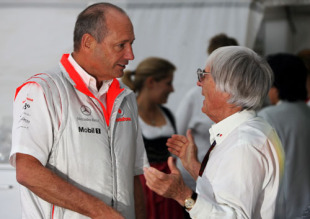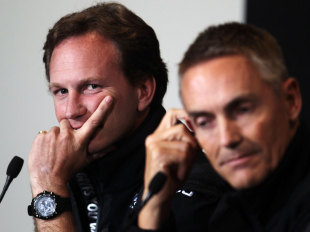
- GP Week
Role reversal?

Haters gonna hate. It's probably a motto that Red Bull Racing has learned to embrace owing to their successive world drivers' and constructors' titles. Such ascendancy inevitably attracts the attention of the jaundiced eye and in so doing renders the object of its gaze all the more canny, calculated and cagey.
Whether we like it or not, success changes us. Even Fernando Alonso - once quick with a card trick or game of garage football - has resolved into a more hardboiled version of his former pre-world champion self; likely germinating from his troubled McLaren tenure. But Formula One teams are a different beast entirely and the growing pains of success have embossed themselves markedly on both Red Bull and McLaren, albeit in divergent forms...
Red Bull Racing started out as a funky, 'party' team, but with continued success, has become more autogenous. The days of semi-naked pool displays and obtaining a soundbite from Vitantonio Luizzi bemoaning bans on cockpit frippery, have been replaced by flexible wing protests, Resource Restriction debates and inter-team rivalries. Once the kings of misdirected endeavour, the Milton Keynes team have stopped pondering what crustacean sauce to serve at lunch and started manoeuvring themselves into positions of considerable power - both in terms of favourable deals with the sport's commercial rights holder and the perception of exercising the unofficial whip-hand amongst the paddock.
Such progress has certainly caught the attention of Ferrari - once viewed in the same cautious light - and forged an obligatory union between the two teams; as seen in their FOTA (Formula One Teams Association) defection. It's not hard to see how this apparent partisanship would irk Red Bull's rivals, especially when Ecclestone consistently reminds the teams it was he who made them rich whenever they show signs of wanting a larger slice of revenue.
Red Bull Racing team principal Christian Horner is quick to temper such apprehension by playing the jealousy card; appealing to Autosport: "There are teams that have struggled to win constructors' world championships that have been around for a long, long time, and that inevitably doesn't sit well."
McLaren, on the other hand, have slowly become more accessible over the past few years, partly due to the arrival of the unflappable Jenson Button and more notably with Martin Whitmarsh at the helm as team principal. Whitmarsh in particular has been instrumental in rescuing the remnants of FOTA after the departure of Red Bull and Ferrari and more often than not, works in the interests of the sport and its oft-neglected audience.

But make no mistake, McLaren themselves have been on the receiving end of some stinging retribution over the years. When Ken Tyrrell, Frank Williams and Ron Dennis (then McLaren team principal) sought to sue Bernie Ecclestone over his acquisition of Formula One's commercial rights in 1998, they ultimately lost, but the suit was not soon forgotten by Ecclestone's confidante and then-president of the FIA, Max Mosley.
A finely-honed political animal if ever there was one, Mosley seized upon McLaren's 'Spygate' indiscretion in 2007 by imposing a draconian fine of $100 million. In Tom Bower's recent book on Bernie Ecclestone, Mosley is quoted as joking that the fine bestowed upon McLaren was "$5 million for the offence and $95 million for Ron being a twat."
In the years that followed, McLaren were wary of being outspoken, accepting what many thought were disputable penalties. Most prominent of these was the stewards' decision to strip McLaren driver Lewis Hamilton's 2008 Spa win for "cutting the chicane" whilst passing Kimi Raikkonen. The penalty was issued despite Hamilton having allowed the Finn to retake the position - telemetry evidence even suggested that Hamilton had not only crossed the finish line after Raikkonen, but that he was also travelling 6.7 km/h slower at the time.
McLaren has undergone numerous changes in that time, with Dennis moving his focus to the company's automotive arm and Whitmarsh taking over as team principal. The change in management has been mirrored by a change in media approach. Gently nudged by a need to satisfy sponsor - sorry, 'partner' - obligations in an increasingly dwindling economy, McLaren ventured into an experiment with Vodafone; producing commercials that featured Lewis and Jenson driving taxis, going camping and assembling their own race cars. The campaign was not only a hit, but exposed a warmer side of McLaren that had been buried beneath an uncompromising desire to succeed.
Keen to use digital media as more than just a cynical marketing strategy, McLaren went one step further by producing their own animated series, Tooned, in partnership with digital image wizards Framestore. After a slightly clunky start, the series soon hit its stride, even going as far to lampoon Ron Dennis and send-up the departure of Lewis Hamilton - featuring a surreptitious cameo from in-coming driver Sergio Perez.
On the flip-side, Red Bull's original daily Formula One magazine the Red Bulletin (produced at the track), has gone from being the daily roast in the Formula One paddock to simply an instrument to promote Red Bull-bank-rolled artists, athletes and musicians. Despite the publication's self-proclaimed "inimitably witty, intelligent and pithy style", the sense of fun and irreverence had disappeared.
In a recent issue, the Red Bulletin published an interview with Red Bull driver development boss Helmut Marko, in which the Austrian was heavily critical of Mark Webber, Marko going as far to question the Australian's resourcefulness under pressure. Much has been written of Marko's influence at Red Bull and of his obvious support for Vettel, and it need not be repeated. But whether by switching out new parts at the last moment, or favouring one driver over the other when it comes to strategy, it is clear that the Red Bull pit wall has not been averse to team orders, whether of the overt 'Multi 21' variety or of a more covert sort.
The last time McLaren were accused of favouring one driver over another was Monaco 2007. Given the serpentine track's penchant for Safety Cars, McLaren were forced to split their strategy and fuel Lewis Hamilton heavier than Fernando Alonso. As it happened, the unusual lack of a Safety Car ended Hamilton's challenge for victory, but under the sceptical gaze of the Mosley-era (and illegality of team-orders), questions about favouritism inevitably surfaced.

At the penultimate round in China, Hamilton lost an opportunity to seal the championship by staying out too long on ageing intermediates, sliding into the pit-entry gravel trap and handing Raikkonen victory and Alonso a handy second place. In explaining the team's decision to leave Hamilton out, Ron Dennis gave conspiracy theorists all the ammunition they wanted, saying, "we were not racing Raikkonen, we were racing Alonso."
Since that tumultuous season, McLaren have shown remarkable loyalty to both their drivers, and it has been argued that the team's tendency to let their drivers race has cost them both drivers' and constructors' championships. While true, McLaren's modus operandi of allowing their drivers to race has upheld the integrity of the sport amidst a backdrop of polemics, in-fighting and tyre disputes.
Sergio Perez's wheel-banging antics three weeks ago in Bahrain may have ruffled Jenson Button's feathers at first, but the incident was handled with the kind of maturity we've come to expect from both Jenson and the management at Woking; Whitmarsh shrewdly praising Jenson in the face of journalists hungry for an inter-team squabble scoop.
"Jenson knows his team-mate has been under the hammer," Whitmarsh said after the race at Sakhir. "Perez is young, he has had a bit of pressure, he has something to learn and he had a point to prove. That is the good thing about Jenson. He can stand back and be reflective in a way that you cannot when you are hot and sticky after just stepping out of the cockpit."
A refreshing take and a far cry from the grey image we've become accustomed to associating with McLaren - certainly more effective than a tacky post-race kiss-and-make-up photo call. Mercantile constraints, self-reflection and a desire to bolster audience figures might have played a part in McLaren's reincarnation, but they are to be applauded for it all the same.
Red Bull may have injected more cash into Formula One than any other team since their entry nine years ago, but you have to wonder how that has benefitted their sporting image, as opposed to their bottom line.
